|
153 |
|
One of the Lenten Prefaces also reminds us of this with regards to fasting, as we read this singular expression: "ieiunio... mentem elevas: with fasting the spirit is raised" (Preface IV).
Fasting, to which the Church invites us in this particular season, certainly is not motivated by the physical or aesthetical order, but stems from the need that man has for an interior purification that detoxifies him from the pollution of sin and evil; it educates him to that healthy renunciation which releases the believer from the slavery to self; that renders him more attentive and open to listen to God and to be at the service of the brethren.
For this reason fasting and the other Lenten practices are considered the traditional Christian spiritual "arms" used to fight evil, unhealthy passions and vice. Concerning this, I would like to listen, together with you, to a brief comment of St John Chrysostom.
"As at the end of winter", he writes, "the summer season returns and the navigator launches his boat into the sea, the soldier polishes his arms and trains the horse for battle, the farmer sharpens the scythe, the wayfarer strengthened, continues his journey, and the athlete sets aside his vestments and prepares for the race; so we too, at the start of this fast, like returning to a spiritual springtime, we polish the arms like the soldiers, we sharpen the scythe like the farmers, and as mariners we launch the boat of our spirit to confront the waves of senseless passions, like the wayfarer we continue the journey to heaven, and as the athlete we prepare ourselves for the fight by totally setting aside everything" (cf. Homily to the People of Antioch, n. 3).
In the Message for Lent I extended the invitation to live these 40 days of special grace as a "Eucharistic" time. Drawing from the inexhaustible font of love that the Eucharist is, in which Christ renews the redemptive sacrifice of the Cross, each Christian can persevere on the journey that we solemnly begin today.
The works of charity (almsgiving), prayer, fasting, together with every sincere effort of conversion, find their most lofty significance and value in the Eucharist, centre and culmination of the life of the Church and the history of salvation.
"May this Sacrament that we have received, O Father", we will pray at the end of Holy Mass, "sustain us on our Lenten way, make holy our fasting and render it efficacious to heal our spirit". |
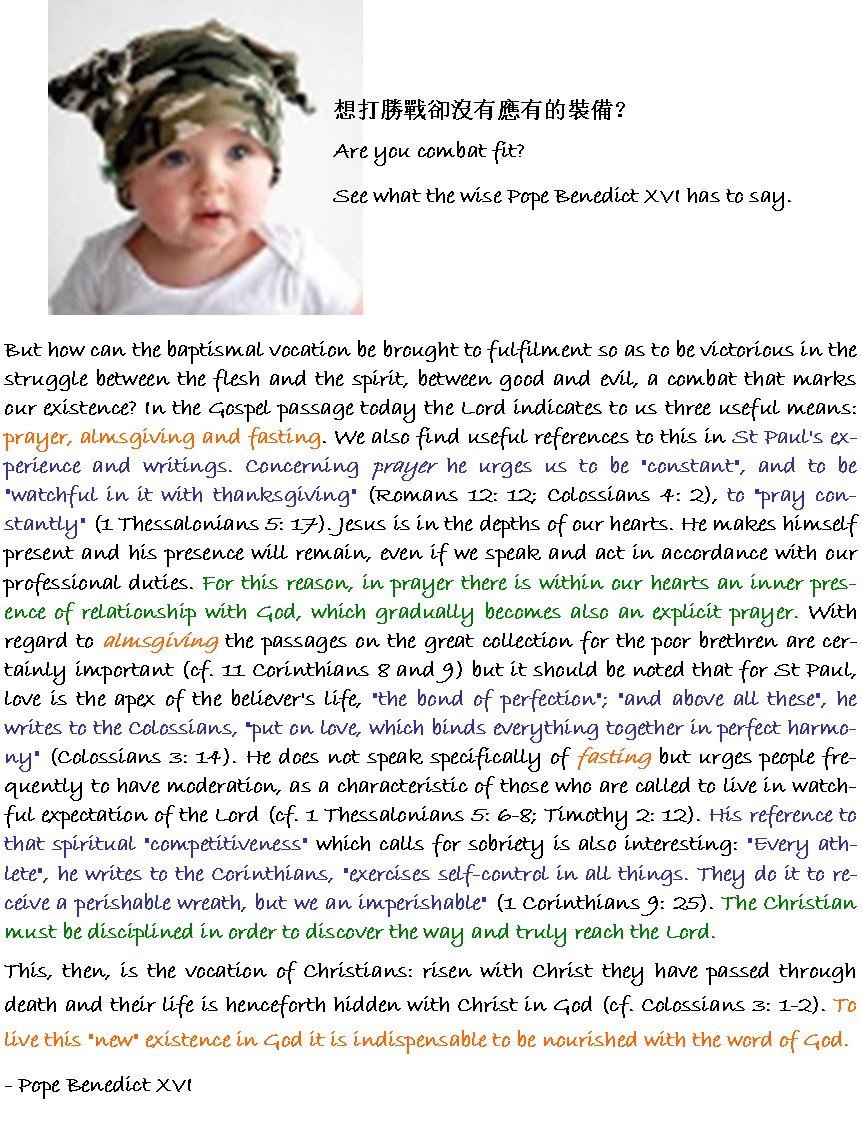
|
"STATIO" AND PENITENTIAL PROCESSION FROM THE CHURCH OF ST ANSELM HOLY MASS, BLESSING AND IMPOSITION OF THE ASHES HOMILY OF HIS HOLINESS BENEDICT XVI Basilica of St Sabina
Dear Brothers and Sisters,
Today, Ash Wednesday a liturgical door opening onto Lent the texts chosen for the celebration sketch the entire structure of the Lenten Season, if only in outline. The Church takes care to indicate to us the necessary spiritual orientation, and she provides us with divine assistance to decisively and courageously make the special spiritual journey we are now beginning, already illuminated by the brilliance of the Paschal Mystery.
"Return to me with all your heart". The appeal for conversion emerges as a dominant theme in every component of today's liturgy. Already in the Entrance Antiphon, it states that the Lord overlooks and forgives the sins of those who repent; in the Collect, Christian people are invited to pray so that each one may undertake a "journey of true conversion". In the First Reading, the Prophet Joel urges us to return to the Father "with your whole heart, with fasting, with weeping, and with mourning.... For he is gracious and merciful, slow to anger, rich in kindness, and relenting in punishment" (2: 12-13). God's promise is clear: if the people will listen to the invitation to conversion, God will make his mercy triumph and his friends will be showered with countless favours. With the Responsorial Psalm, the liturgical assembly makes the invocations of Psalm 51[50] its own, asking the Lord to create within us "a clean heart" and to renew in us "a right spirit". Next is the Gospel passage in which Jesus warns us against the canker of vanity that leads to ostentation and hypocrisy, to superficiality and self-satisfaction, and reasserts the need to foster uprightness of heart. At the same time he shows us the means to grow in this purity of intention: by cultivating intimacy with the heavenly Father.
Particularly welcome in this Jubilee Year, commemorating the 2,000th anniversary of St Paul's birth, the words of the Second Letter to the Corinthians reach us: "We beseech you on behalf of Christ, be reconciled to God" (5: 20). The Apostle's invitation rings out as a further encouragement to take the Lenten call to conversion seriously. Paul experienced in an extraordinary way the power of God's grace, the grace of the Paschal Mystery which gives life to Lent itself. He presents himself to us as an "ambassador" of the Lord. Who better than he, therefore, can help us to progress productively on this journey of inner conversion? In the First Letter to Timothy he writes: "Christ Jesus came into the world to save sinners. And I am the foremost of sinners; but", he adds, "I received mercy for this reason, that in me, as the foremost, Jesus Christ might display his perfect patience for an example to those who were to believe in him for eternal life" (1: 15-16). Thus, the Apostle is aware that he has been chosen as an example, and this exemplarity of his concerns precisely conversion, the transformation of his life that was brought about by God's merciful love. "I formerly blasphemed and persecuted and insulted him", he recognizes, "but I received mercy... and the grace of our Lord overflowed" (ibid., 1: 13-14). All of his preaching and even more his entire missionary existence was sustained by an inner urge that can be traced back to the fundamental experience of "grace". "By the grace of God I am what I am", he writes to the Corinthians, "...I worked harder than any of them [the Apostles], though it was not I, but the grace of God which is with me" (1 Corinthians 15: 10). It is a question of an awareness that surfaces in all his writings and that served as an inner "lever" with which God could propel him onwards, toward ever further boundaries, not only geographical but also spiritual.
St Paul recognizes that everything in him is the work of divine grace but he does not forget that it is necessary to adhere freely to the gift of new life received in Baptism. In the text of chapter six of his Letter to the Romans, which will be proclaimed during the Easter Vigil, he writes: "Let not sin therefore reign in your mortal bodies, to make you obey their passions. Do not yield your members to sin as instruments of wickedness, but yield yourselves to God as men who have been brought from death to life, and your members to God as instruments of righteousness" (6: 12-13). Contained in these words we find the entire programme of Lent, in accordance with its intrinsic baptismal perspective. On one hand they affirm the victory of Christ over sin, which happened once and for all with his death and Resurrection. On the other, we are urged not to yield our bodies to sin, that is, not to allow sin any room, so to speak, to take its revenge. The victory of Christ expects the disciple to make it his own and this happens first of all with Baptism, through which, united with Jesus, we became "living, returned from the dead". The baptized person, however, in order that Christ may fully reign within him, must faithfully follow his teachings; he must never lower his gaze so as not to let the adversary gain ground in any way.
But how can the baptismal vocation be brought to fulfilment so as to be victorious in the struggle between the flesh and the spirit, between good and evil, a combat that marks our existence? In the Gospel passage today the Lord indicates to us three useful means: prayer, almsgiving and fasting. We also find useful references to this in St Paul's experience and writings. Concerning prayer he urges us to be "constant", and to be "watchful in it with thanksgiving" (Romans 12: 12; Colossians 4: 2), to "pray constantly" (1 Thessalonians 5: 17). Jesus is in the depths of our hearts. He makes himself present and his presence will remain, even if we speak and act in accordance with our professional duties. For this reason, in prayer there is within our hearts an inner presence of relationship with God, which gradually becomes also an explicit prayer. With regard to almsgiving the passages on the great collection for the poor brethren are certainly important (cf. 2 Corinthians 8 and 2 Corinthians 9) but it should be noted that for St Paul, love is the apex of the believer's life, "the bond of perfection"; "and above all these", he writes to the Colossians, "put on love, which binds everything together in perfect harmony" (Colossians 3: 14). He does not speak specifically of fasting but urges people frequently to have moderation, as a characteristic of those who are called to live in watchful expectation of the Lord (cf. 1 Thessalonians 5: 6-8; Timothy 2: 12). His reference to that spiritual "competitiveness" which calls for sobriety is also interesting: "Every athlete", he writes to the Corinthians, "exercises self-control in all things. They do it to receive a perishable wreath, but we an imperishable" (1 Corinthians 9: 25). The Christian must be disciplined in order to discover the way and truly reach the Lord.
This, then, is the vocation of Christians: risen with Christ they have passed through death and their life is henceforth hidden with Christ in God (cf. Colossians 3: 1-2). To live this "new" existence in God it is indispensable to be nourished with the word of God. Only in this way can we truly be united with God and live in his presence if we are in dialogue with him. Jesus says so clearly when he responds to the first of the three temptations in the desert, citing Deuteronomy: "Man shall not live by bread alone, but by every word that proceeds from the mouth of God" (Matthew 4: 4; cf. Deuteronomy 8: 3). St Paul advises: "Let the word of Christ dwell in you richly, as you teach and admonish one another in all wisdom, and as you sing psalms and hymns and spiritual songs" (Colossians 3: 16). In this too, the Apostle is primarily a witness. His Letters are eloquent proof that he lived in constant dialogue with the word of God. His thought, action, prayer, theology, preaching and exhortation: everything in him was the fruit of the word, received in the Jewish faith from his youth and fully revealed to his eyes by his encounter with the dead and Risen Christ, which he preached for the rest of his life during his missionary "race". It was revealed to St Paul that in Jesus Christ God had pronounced his definitive Word, himself, a Word of salvation that coincided with the Paschal Mystery the gift of himself on the Cross which then became Resurrection, because love is stronger than death. Thus, St Paul could conclude: "Far be it from me to glory except in the Cross of our Lord Jesus Christ, by which the world has been crucified to me, and I to the world" (Galatians 6: 14). In Paul the Word became life and his one boast is the Crucified and Risen Christ.
Dear brothers and sisters, while we prepare to receive Ashes on our heads as a sign of conversion and repentance, let us open our hearts to the vivifying action of the word of God. May Lent, marked by more frequent listening to this word, by more intense prayer, by an austere and penitential lifestyle, be an incentive to conversion and to sincere love towards our brothers, especially those who are poorest and neediest. May the Apostle Paul accompany us; may Mary, the attentive Virgin of listening and the humble Handmaid of the Lord guide us. Thus spiritually renewed, we shall succeed in celebrating Easter joyfully. Amen! |

|
The Second Reading, Paul's appeal to be reconciled to God (cf. 2 Corinthians 5: 20), contains one of the celebrated Pauline paradoxes, which leads to the whole reflection on justice in the mystery of Christ. St Paul writes, "For our sake he made him to be sin who knew no sin" that is, his Son made Man "so that in him we might become the righteousness of God" (2 Corinthians 5: 21). In Christ's heart, in other words at the core of his divine and human Person, the entire drama of freedom was played out in decisive and definitive terms. God took his own plan of salvation to extreme consequences, remaining faithful in his love even at the price of sending his only Son to death, to death on the Cross. As I wrote in my Lenten Message, "Here we discover divine justice, which is so profoundly different from its human counterpart.... Thanks to Christ's action, we may enter into the "greatest' justice, which is that of love (cf. Romans 13: 8-10)". - Pope Benedict XVI |
|
"STATIO" AND PENITENTIAL PROCESSION HOLY MASS, BLESSING AND IMPOSITION OF THE ASHES HOMILY OF HIS HOLINESS BENEDICT XVI Basilica of St Sabina
"Lord, you are merciful to all, and hate nothing you have created.
Venerable Brothers in the Episcopate,
With this moving invocation from the Book of Wisdom (cf. 11: 23-26), the Liturgy opens the Eucharistic Celebration of Ash Wednesday. In a certain way, these words introduce the entire Lenten journey; they establish the omnipotence of God's love as the basis, his absolute dominion over every creature which is expressed in infinite forgiveness and animated by the constant, universal desire for life. Indeed, forgiving someone is equivalent to telling him or her: I do not want you to die, but to live; I always and only want the best for you.
This absolute certainty sustained Jesus during the 40 days he spent in the Judean desert, after he had received Baptism from John in the Jordan. For him that long period of silence and fasting was a complete abandonment of himself to the Father and to his plan of love. The time was a "baptism" in itself, that is, an "immersion" in God's will and in this sense a foretaste of the Passion and of the Cross. Going out into the desert alone to remain there at length meant exposing himself willingly to the assaults of the enemy, the tempter who brought about Adam's fall and whose envy caused death to enter the world (cf. Wisdom 2: 24). It meant engaging in battle with him, with nothing but the weapon of boundless faith to challenge him, in the omnipotent love of the Father. Your love is enough for me, my food is to do your will (cf. John 4: 34): this conviction pervaded Jesus' mind and heart during his time of "Lent". It was neither an act of pride nor a titanic undertaking but rather a humble choice, consistent with the Incarnation and the Baptism in the Jordan, in the same vein of obedience to the merciful love of the Father, who "so loved the world that he gave his only Son" (John 3: 16).
Our Lord Jesus did all this for us. He did it to save us, and at the same time to show us the path on which to follow him. Salvation is in fact a gift; it is the grace of God, but in order for it to make an impact on my life it requires my assent, an acceptance that is demonstrated in my actions in other words, the will to live like Jesus, to follow him. Following Jesus into the Lenten desert is therefore a prerequisite for participating in his Pasch, in his "exodus". Adam was banished from the earthly Paradise, a symbol of communion with God. Now, in order to return to this communion and thus to true life, to eternal life, it is necessary to cross the desert, the trial of faith not alone, but with Jesus! He has preceded us, as always, and has already won the battle against the spirit of evil. This is the meaning of Lent, the liturgical Season that every year invites us to renew our decision to follow Christ on the path of humility, in order to take part in his victory over sin and death.
In this perspective one can also understand the penitential symbol of the ashes, which are placed upon the heads of all those who begin the Lenten journey with good will. It is essentially an act of humility that means: I recognize myself for what I am, a frail creature, made from earth and destined to return to earth, yet also made in the image of God and destined for him. I am dust, yes, but also beloved, shaped by his love, animated by his vital breath, able to recognize his voice and respond to him. I am free and therefore capable of disobeying him, of giving in to the temptation of pride and self-sufficiency. This is sin, the deadly illness that came so soon to pollute the blessed earth that is the human being. Created in the image of the Holy and the Just, man lost his own innocence. Now he can only return to being just by the grace of God's justice, the justice of love that, as St Paul writes, "has been manifested... through faith in Jesus Christ" (cf. Romans 3: 21-22). These words of the Apostle provided an inspiration for the Message I addressed to all the faithful for this Lent, which is a reflection on the theme of justice in the light of the Sacred Scriptures and their fulfilment in Christ.
The theme of justice is also very present in Ash Wednesday's biblical readings. First, the passage from the prophet Joel and the Responsorial Psalm the Miserere form a penitential diptych. This highlights what the Bible calls "iniquity" that is, sin, which fundamentally consists in disobeying God, which means a lack of love as the origin of every material and social injustice. "For I know my transgressions", the Psalmist confesses, "and my sin is ever before me. / Against you, you only, have I sinned, / and done that which is evil in your sight" (Psalm 51[50]: 3-4 [rsv]). The first act of justice is therefore recognizing one's own iniquity and realizing that it is rooted in the "heart", at the very core of the human person. The "fasting", "weeping" and "mourning" (cf. Joel 2: 12), and any other expression of penitence only have value in God's eyes if they are signs of sincerely repentant hearts.
The Second Reading, Paul's appeal to be reconciled to God (cf. 2 Corinthians 5: 20), contains one of the celebrated Pauline paradoxes, which leads to the whole reflection on justice in the mystery of Christ. St Paul writes, "For our sake he made him to be sin who knew no sin" that is, his Son made Man "so that in him we might become the righteousness of God" (2 Corinthians 5: 21). In Christ's heart, in other words at the core of his divine and human Person, the entire drama of freedom was played out in decisive and definitive terms. God took his own plan of salvation to extreme consequences, remaining faithful in his love even at the price of sending his only Son to death, to death on the Cross. As I wrote in my Lenten Message, "Here we discover divine justice, which is so profoundly different from its human counterpart.... Thanks to Christ's action, we may enter into the "greatest' justice, which is that of love (cf. Romans 13: 8-10)".
Dear brothers and sisters, Lent broadens our horizons; it orients us to eternal life. On this earth we are on a pilgrimage: "Here we have no lasting city, but we seek the city which is to come", according to the Letter to the Hebrews (Hebrews 13: 14). Lent shows us the relativity of the goods of this earth, thus rendering us capable of the necessary sacrifices and free to do good. Let us open our world to the light of Heaven, to the presence of God among us. Amen. |
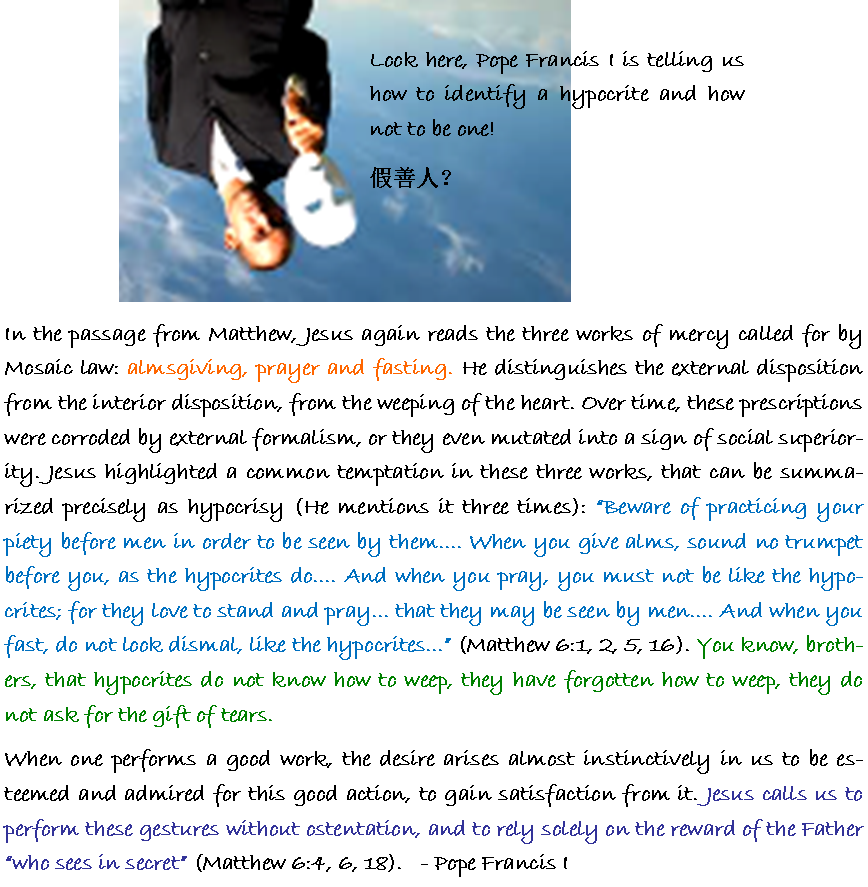
|
HOLY MASS, BLESSING AND IMPOSITION OF THE ASHES HOMILY OF POPE FRANCIS Basilica of Santa Sabina
As the People of God begin the journey of Lent, the time in which we seek to be more firmly united to the Lord, to share the mystery of His Passion and His Resurrection.
Today’s liturgy offers us first and foremost a passage from the Prophet Joel, whom God sent to call the People of God to repentance and conversion, due to a natural disaster (a plague of locusts) which was devastating Judea. The Lord alone can save us from the scourge and it is therefore necessary to entreat Him with prayer and fasting, confessing one’s sins.
The Prophet emphasizes interior conversion: “return to me with all your heart” (2:12).
Returning to the Lord “with all your heart” means to begin the journey not of a superficial and transitory conversion, but rather of a spiritual itinerary with regard to the most intimate place of our person. The heart is, indeed, the seat of our feelings, the centre in which our decisions, our attitudes mature. That “return to me with all your heart” involves not only individuals, but is extended to the community as a whole. It is a convocation directed to everyone: “gather the people. Sanctify the congregation; assemble the elders; gather the children, even nursing infants. Let the bridegroom leave his room, and the bride her chamber” (v. 16). The Prophet pauses particularly on the prayer of the priests, pointing out that it is to be accompanied by tears. It will do us good, all of us, but especially for us as priests, at the beginning of Lent, to ask for the gift of tears, so as to render our prayer and our journey of conversion ever more authentic and free from hypocrisy. It will do us good to ask ourselves this question: “Do I weep? Does the Pope weep? Do the cardinals weep? Do bishops weep? Do the consecrated weep? Do priests weep? Is there weeping in our prayers?”. And this is precisely the message of today’s Gospel. In the passage from Matthew, Jesus again reads the three works of mercy called for by Mosaic law: almsgiving, prayer and fasting. He distinguishes the external disposition from the interior disposition, from the weeping of the heart. Over time, these prescriptions were corroded by external formalism, or they even mutated into a sign of social superiority. Jesus highlighted a common temptation in these three works, that can be summarized precisely as hypocrisy (He mentions it three times): “Beware of practicing your piety before men in order to be seen by them.... When you give alms, sound no trumpet before you, as the hypocrites do.... And when you pray, you must not be like the hypocrites; for they love to stand and pray... that they may be seen by men.... And when you fast, do not look dismal, like the hypocrites...” (Matthew 6:1, 2, 5, 16). You know, brothers, that hypocrites do not know how to weep, they have forgotten how to weep, they do not ask for the gift of tears. When one performs a good work, the desire arises almost instinctively in us to be esteemed and admired for this good action, to gain satisfaction from it. Jesus calls us to perform these gestures without ostentation, and to rely solely on the reward of the Father “who sees in secret” (Matthew 6:4, 6, 18).
Dear brothers and sisters, the Lord never tires of having mercy on us, and wants to offer us His forgiveness once again — we all need it — , inviting us to return to Him with a new heart, purified of evil, purified by tears, to take part in His joy. How should we accept this invitation? St Paul advises us: “We beseech you on behalf of Christ, be reconciled to God” (2 Corinthians 5:20). This power of conversion is not only the work of mankind, it is letting oneself be reconciled. Reconciliation between us and God is possible thanks to the mercy of the Father who, out of love for us, did not hesitate to sacrifice His only begotten Son. Indeed Christ, who was just and without sin, was made to be sin (cf. v. 21) when, on the Cross, He took on the burden of our sins, and in this way He redeemed and justified us before God. “In Him” we can become just, in Him we can change, if we accept the grace of God and do not allow this “acceptable time” to pass in vain (6:2). Please, let us stop, let us stop a while and let ourselves be reconciled to God.
With this awareness, we begin the Lenten journey with trust and joy. May Immaculate Mother Mary, without sin, sustain our spiritual battle against sin, accompany us at this acceptable time, so that we may come together to sing of the exultant victory on Easter Day. And as a sign of the will to let ourselves be reconciled to God, in addition to the tears that will be “in secret”, in public we will perform this gesture of the imposition of Ashes on the head. The celebrant speaks these words: “Remember that you are dust, and to dust you shall return” (cf. Genesis 3:19); or repeats the exhortation of Jesus: “Repent, and believe in the Gospel” (cf. Mark 1:15). Both formulae are a reference to the truth of human existence: we are limited creatures, always sinners in need of repentance and conversion. How important it is to listen to and accept this call in this time of ours! The call to conversion is thus an incentive to return, as the son in the parable did, to the arms of God, gentle and merciful Father, to weep in that embrace, to trust in Him and entrust ourselves to Him.
Read more Homilies:
Saint Pope John Paul II:
Homily 17 March 1999 (Encouragements-375).
Homily 13 February 2002 (Encouragements-376) &
Homily 25 February 2004 (Encouragements-198).
Pope Benedict XVI:
Homily 6 February 2008 (Encouragements-376),
Homily 9 March 2011 (Encouragements-377),
Homily 22 February 2012 (Encouragements-198),
Homily 13 February 2013 (Encouragements-199) &
Angelus 13 February (Encouragements-200).
Pope Francis I:
Homily 5 March 2014 (Encouragements-377) &
General Audience 5 March 2014 (Encouragements-377).
Acknowledgment: We thank the Vatican Publisher for allowing us to publish the Homilies of Saint Pope John Paul II, Pope Benedict XVI & Pope Francis I, so that they could be accessed by more people all over the world; as a source of God’s encouragements to all of us.
28 March 2015, 7:00am |
|
First Sunday of Lent, Gospel Reading: Extracted from the holy Gospel according to Mark 1:12-15 The Spirit drove Jesus out into the wilderness and he remained there for forty days, and was tempted by Satan. He was with the wild beasts, and the angels looked after him. After John had been arrested, Jesus went into Galilee. There he proclaimed the Good News from God. ‘The time has come’ he said ‘and the kingdom of God is close at hand. Repent, and believe the Good News.’
Sharing: It was the 1st Sunday of Lent on 22 February 2015. The Readings that were read in the Eucharistic Celebrations all over the world on the same day are shown above: 1st Reading: Genesis 9:8-15, Responsorial: Psalm 25: 4-6, 7-9, 2nd Reading: 1 Peter 3:18-22 & Gospel Reading: Mark 1:12-15. We have extracted the Homilies Blessed Pope John Paul II, Pope Benedict XVI & Pope Francis I based on the aforesaid Readings to share with you, so that you could similarly be encouraged:
EUCHARISTIC CELEBRATION AT THE PARISH HOMILY OF POPE JOHN PAUL II Sunday, 16 February 1997
1. “Behold I establish my covenant with you” (Genesis 9:8).
The Liturgy of the Word for this First Sunday of Lent presents us with the covenant God made through Noah with men and creation after the flood. Once again we have heard the solemn words spoken by God: “Behold, I establish my covenant with you and your descendants after you, and with every living creature that is with you.... I establish my covenant with you, that never again shall all flesh be cut off by the waters of a flood, and never again shall there be a flood to destroy the earth” (Genesis 9:9-11).
This covenant has a characteristic value of its own in the Old Testament. God, Creator of man and of all living beings, had with the flood destroyed, in a certain sense, all that he had brought into being. This punitive decision had been provoked by the spread of sin in the world after the original fall of our first parents.
However, the waters had spared Noah and his family along with the animals he had taken with him into the ark. In this way man and the other living beings were saved, and, having survived the Creator’s punishment, after the flood they constituted the beginning of a new covenant between God and creation.
Continue next page ...
3 April 2015, 3:00pm SGT |
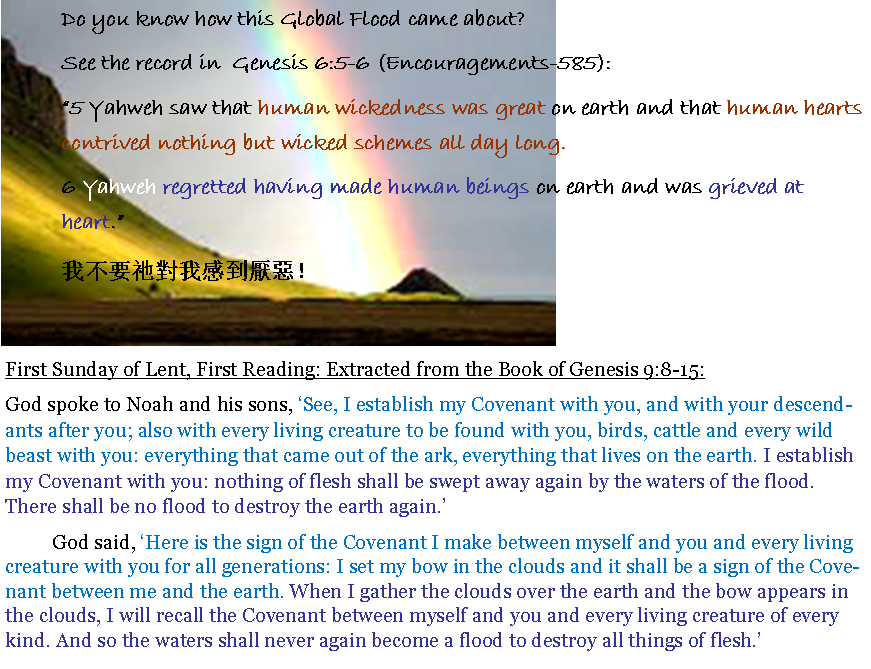
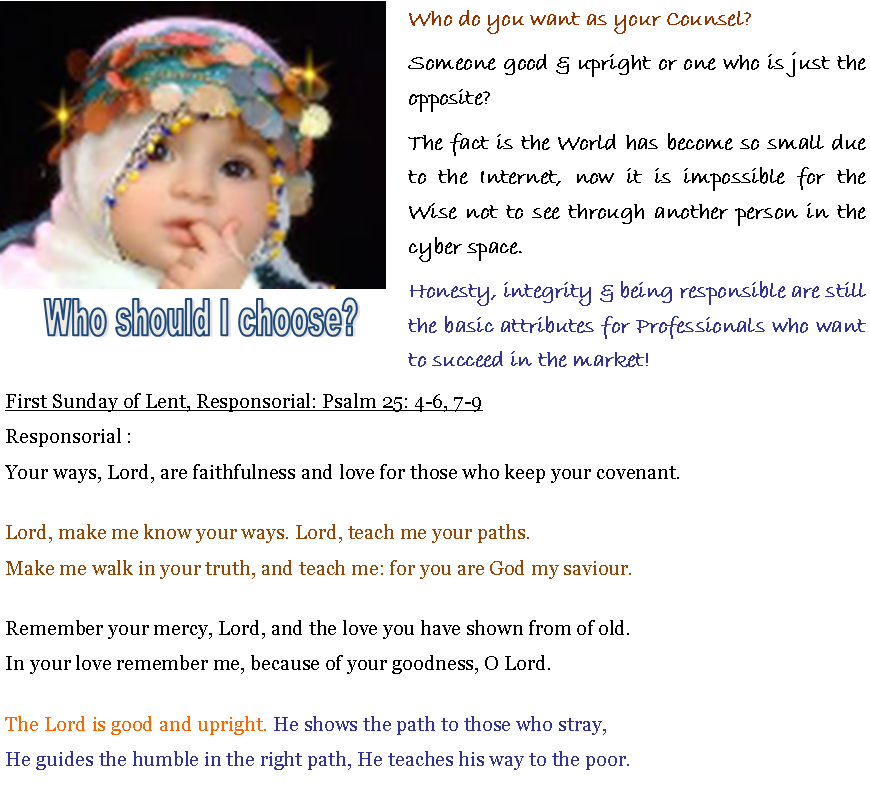
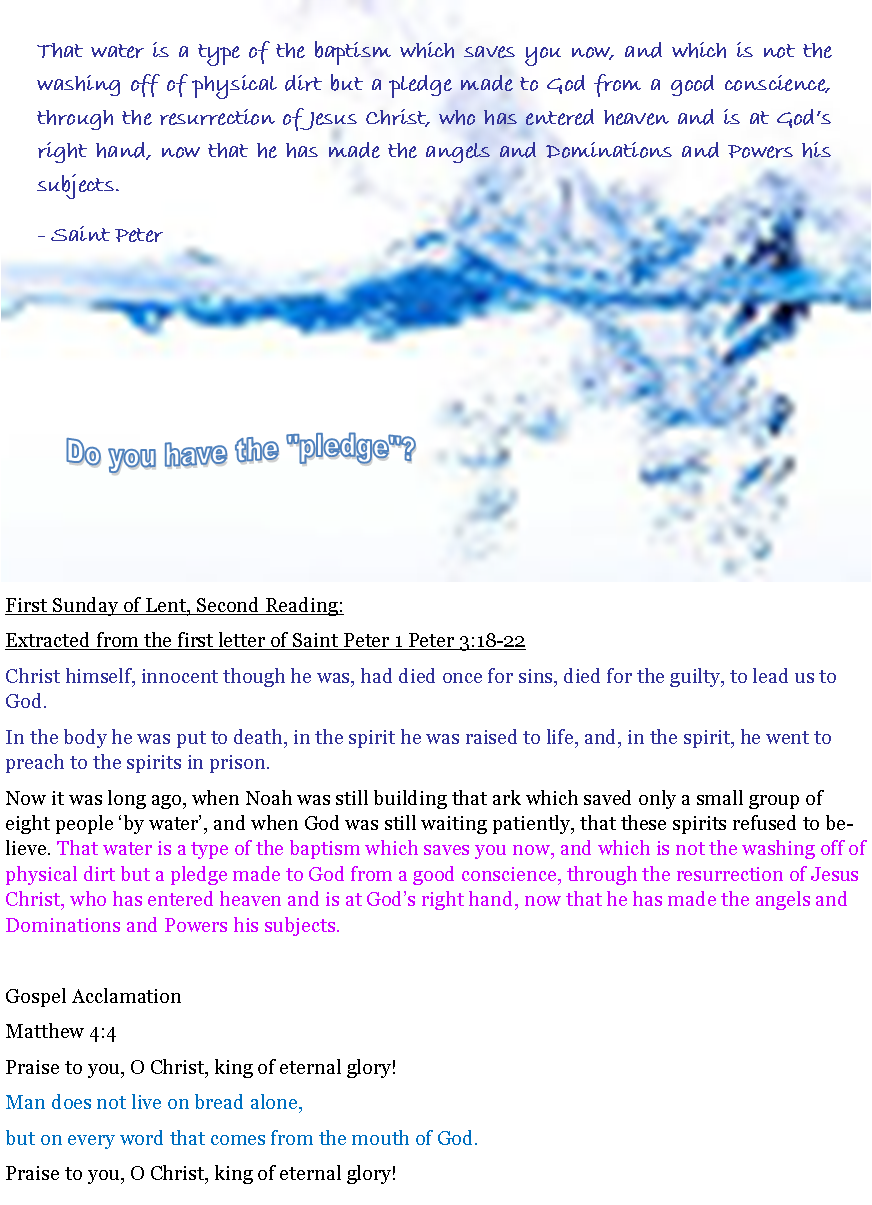

|
You asked, ‘What’s the use to repent and believe in the good news?’ You decide if you want good luck to chase after you round the clock: See Proverbs 10 (Encouragements-55), Proverbs 13 & 14 (Encouragements-56) & Psalm 9 (Encouragements-90). 8-) 好笑嗎? |